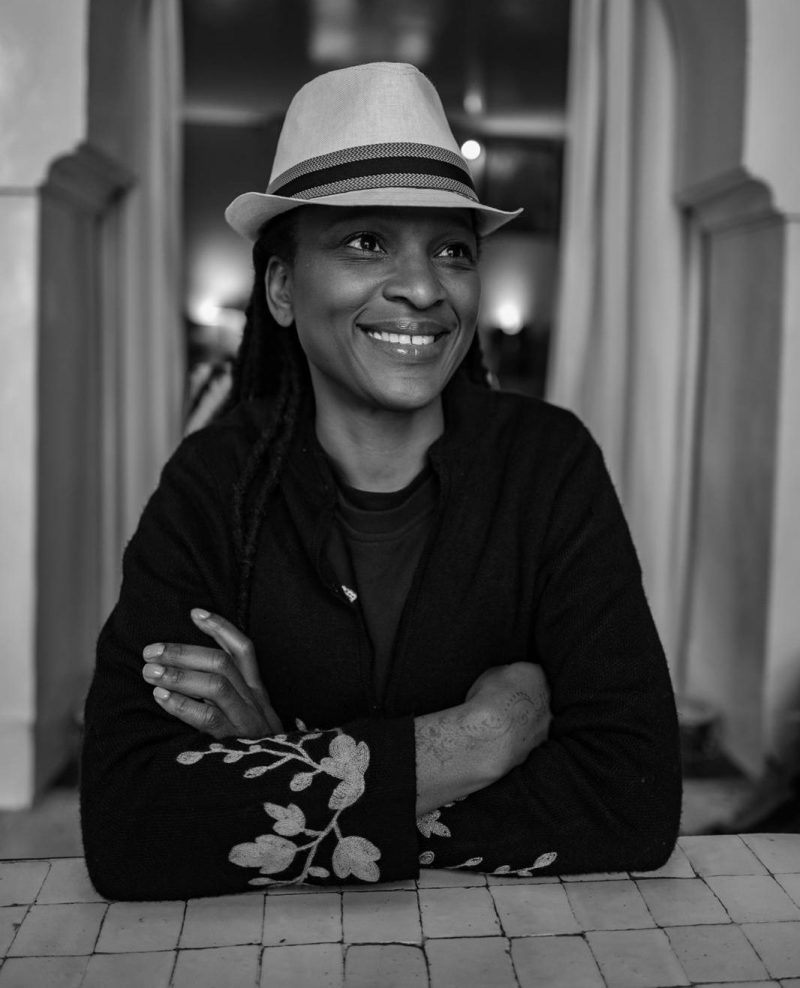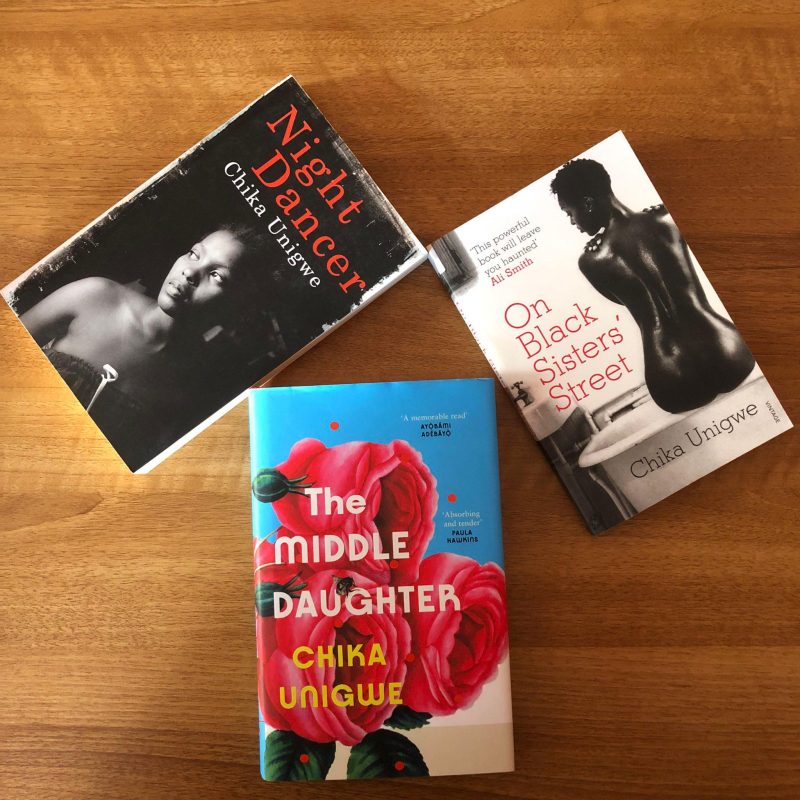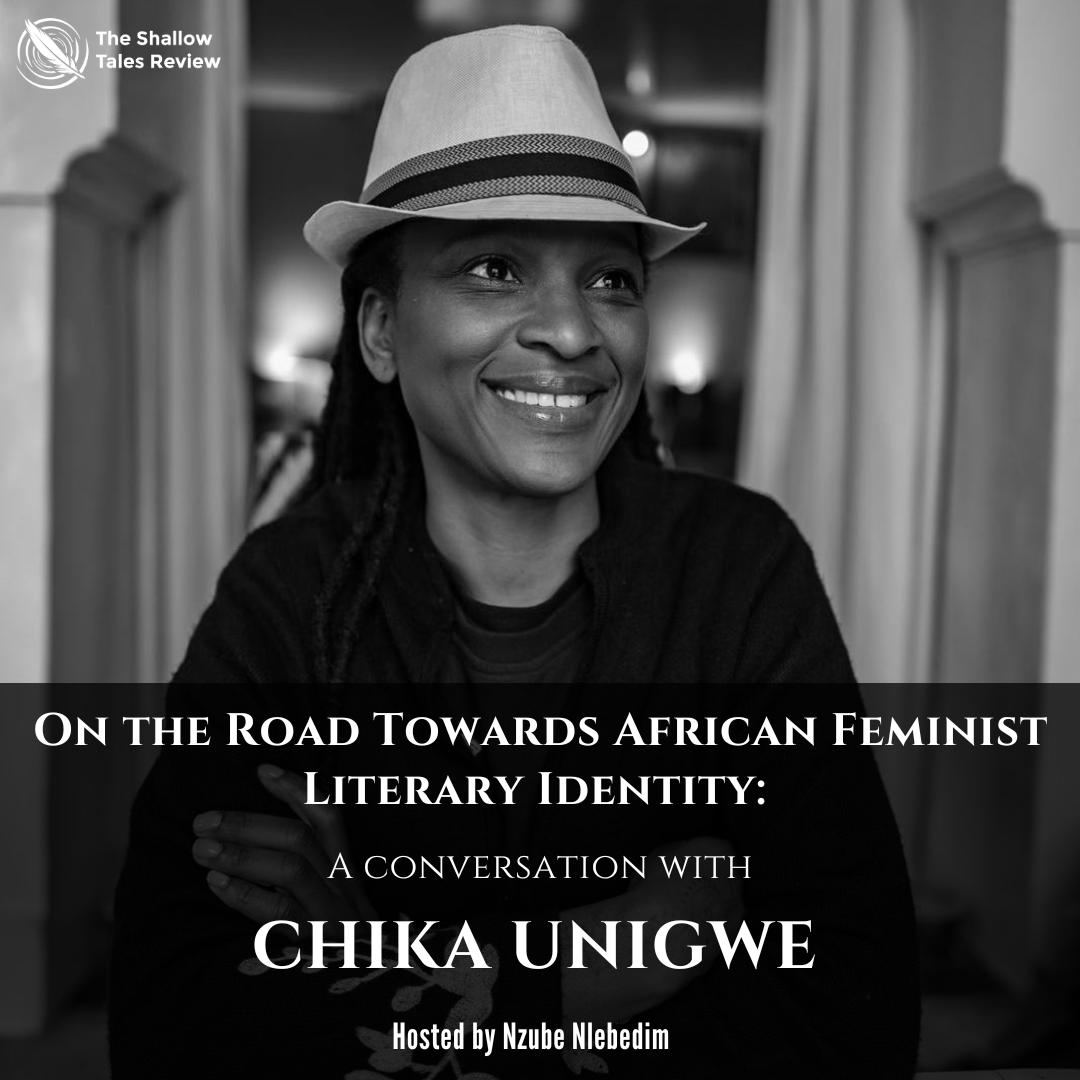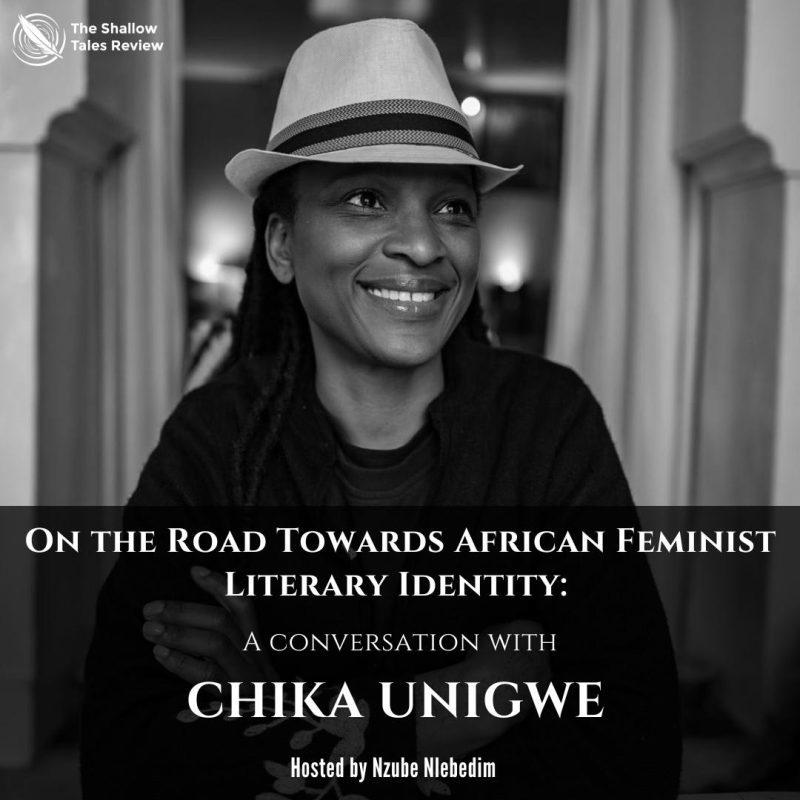(Photo credit: Misan Harriman)
Chika Unigwe was born and raised in Enugu. Her most recent novel is The Middle Daughter. Her new novel, Grace, will be out in 2025. She is a professor of creative writing at Georgia College and State University, Milledgeville, Georgia.
Your body of work concerns the complexities of living as an African woman, both in Africa and otherwise. This concern has become an ideological thread also spun across your short stories and children’s books. Was there a deliberate decision from the start of your career to write about women, or had you simply “fallen” into it, as some other writers have said was the case for them?
Thank you for this question. It’s one I’ve also begun to ask myself: why am I consistently drawn to similar themes? Why do I return to the stories of people at the margins—who, in our patriarchal societies, are often women? And why is it so important to me that my protagonists find justice (as opposed to revenge)?
I was raised Catholic (and I still am), and I believe this background has attuned me to stories of oppression and marginalisation. Listening to homilies that contemporise the Bible remind me of my duty as a Catholic to work towards a more just society – and that includes writing about the oppressed. So did I fall into writing about women? No, I was born into it, but I have also intentionally chosen it, and I renew that decision every day. Social justice is a huge part of Catholicism. To be a practicing catholic is to care about both the soul and the body. You can pray for people, but it is equally important to meet their physical and emotional needs, too. It is important to work towards a world where justice is accessible to everyone, where health care and education aren’t just for the wealthy, and where women have the same access as men. I am proudly feminist because I am proudly Catholic.
As a child, I attended Uzommiri, an Opus Dei Centre in Enugu, where I first encountered Buchi Emecheta’s work. We watched a documentary about her in which she described her husband burning her first manuscript. Her stories exposed me to the dangers of a culture that teaches men that they are superior to women, that a wife, who’s doing well/better than her husband is a threat rather than a gift. Emecheta’s life story, from the moment I discovered her, had a huge impact on me. In a way, you can say that every strong woman protagonist I write is a version of Emecheta fighting her way out of a marriage that oppressed her, fighting a society that told her she was less than because she was Black and a woman, and succeeding to a very large extent.
Hope is important to me because without it, we may as well give up trying. It is that optimism, that small ray of light that my protagonists’ journeys provide. And it is why I write.
In The Middle Daughter, Nani is easily reminiscent of the old image of the African woman as simply a pleasure giver and background manager; one who is expected to be quiet. But then, through Ugo, Nani finds the agency and strength she needs to liberate herself from Ephraim. Nani and Ugo, as well as Aunty Enuka, share a deep relationship. Tell us briefly about the process of creating these women, especially Nani and Ugo.
Nani always had the power to free herself, she just needed reminding. The strength is all hers. If she doubted that she could make it outside of Ephraim’s prison, she would have found multiple excuses to remain. I believe in the power of community; no one is an island. Our communities help us amplify our voices. They remind us of what we have forgotten we have. Abuse has the power to erode us of our sense of self. It makes a mockery of our self-esteem, and sometimes, like Nani, we need someone who sees us better than we see ourselves to step in and tell us, like Nani’s neighbour does to her, “You don’t belong here.”
What Ugo provides for Nani is the very immediate means to escape. Money and a phone. Access, in other words. Aunty Enuka provides her with a roof , and the means to get justice. Without these women, she may never have left, at least not with her children.
I am the 6th of 7, and I have 4 sisters. Some of my closest relationships are with my sisters. I also have a few really close female friends. I wanted to gift Nani with a community of powerful women who are rooting for her success.
In The Phoenix, Night Dancer, On Black Sisters’ Street, and Daughter, you cast very strong female characters who belittle the antics of a male-centered society, even far away from Africa. You seem to suggest that the struggle women face is universal. Still, something else you imply to be widespread is the potency of unity amongst women. In Street, the four ladies hold themselves up; in Night Dancer, Mma looks up to her mother Ezi. In Daughter, Nani is supported by Ugo. What is your own idea of the importance of female unity in your work?
Sisterhood is a powerful tool. I have benefitted from it, and I hope that I have had others benefit from me being a part of their sisterhood. We, as women, must hold each other up as much as we can. In a world where we are still marginalised, we have to form alliances that benefit us. That is how we challenge and change culture.
The direction of feminist writings in the 21st century seems not only progressive but consistent, too. Maaza Mengiste speaks about rewriting the feminist ethos. How difficult a task has this been for you over the past twenty years of writing?
The portrayal of strong, feminist women in African literature has been consistent since at least Flora Nwapa’s Efuru (1962), in which the eponymous character, Efuru, gives her husband the money to pay her own bride price and eventually leaves a marriage that stifles her. She returns to her father’s house and assumes culturally male roles, such as paying school fees and hospital bills for the poor. This tradition of writing powerful, self-determined women isn’t a 21st-century invention; it’s long-standing. Think of Aissatou in Mariama Bâ’s So Long a Letter, the protagonist of Aidoo’s Our Sister Killjoy, or Firdaus in El-Saadawi’s Woman at Point Zero (1977).
Since the earliest works by African women writers, those attuned to the dangers and injustices of patriarchy have written women who resist it in various ways. The challenge now is to read these characters as feminist by broadening our understanding of what feminism can be. We often think of only certain types of women as fitting the feminist model, overlooking figures like the widowed woman in the village who sells roasted corn to put her children through school. As writers, our task is to capture all these experiences and the ways the feminist ethos manifests in our cultures.

What is your impression on the representation of women in African literature today? Do you feel there has been enough work put into reforming the identity of women in African fiction?
I’m uncertain how to approach this question because it asks me to judge the characterisation of women in African novels from the 1960s to the present, as though African women share a single, unified identity. However, from my knowledge of representative works by African women writers—from Efuru (the earliest novel published by an African woman in English) to Agbaje’s Parlour Wife, which has just been released—I can say that women protagonists have continually challenged the status quo in diverse ways.
I believe we, African women writers, have consistently written against the stereotyped portrayals of women in traditional folktales, proverbs, and early male-authored novels, where women were often marginal to the central narrative. Through our work as African women authors, we have continued to expand female identity, presenting complex and multidimensional characters who defy simplistic boxes. And we shall continue to do so because these women are us, they are our mothers, our sisters.
Fiction’s job isn’t only to present reality as is, but to present it as it could be, so expect to see more women in our fiction breaking new grounds.
The politics of feminism is now becoming increasingly complex, especially with the upswing of social media sites, especially X. There are growing conversations, too, which are exposing the more complex dynamics of 21st century feminist thinking. The broadening of the scope of gender and sexuality is also advancing this politics. Do you imagine that this new direction will benefit African feminist writings coming up?
I don’t know that “the politics of feminism” is getting complex, unless by that you mean that the idea of a monolithic, universal feminism that manifests in just one way is challenged. What the upswing of social media sites contributes is a democratisation of the conversations around everything, including feminisms. And in real time, across cultures. It expands our understanding and knowledge of feminisms. This visibility and exchange are beneficial because they bring different feminist perspectives into broader, interconnected conversations, and invites us to move beyond a monolithic view of African womanhood and/or feminism.
You have made great impact on an already charged field of African writing, climbing on the legacies of such female writers as Aidoo, Emecheta, Nwapa, Bâ, Mugo, and others. How do you envision feminist writings in Africa in the coming years? What picture of the African women in fiction would you like to see in the next decade?
I think that every writer has to decide that for themselves how they want to expand or contribute to the feminist canon. I hope that we keep telling our stories, that we keep showing that there is no one way of being an African woman.
Back to The Middle Daughter. The girls’ Mother, with whom you have mentioned you had arguments in your head, symbolises largely the failing of feminine trust, especially by a mother to her daughter. We see Mother also in a character like Ezi, and in the mother of Ama. Is there anything for us to glean from this “failing mother” parallel?
She is not a failed mother; she’s trying to mother as best she can with the tools she has. She is a creature of her society, a widow who knows how much she’s being scrutinised especially. A mother of daughters in a society where silence around sexual assault is encouraged. She is aware that there are people waiting for her to fail in her duties as a mother, and she sees what she considers as Nani’s ‘elopement’ as a failure, and the only way she knows to deal with a daughter like that, the only way she’s learned to, is by withdrawing her obligations to that daughter. Likewise Ezi. She isn’t a failed mother. She’s a woman failed by a patriarchal society. Our cultures and our societies influence how we manifest our love. A few years ago, there was a man in some south west state whose teenage daughter was raped by their family tailor. The man took the tailor to court and demanded that the tailor be forced to marry his daughter because having “defiled” her, who else would have her? He loved his daughter too much to have her not ever marry. His society/culture prioritises any marriage above none, and passes on the shame of sexual assault to the victim rather than to the criminal. It’s shocking, but as far as he was concerned, this father did what he did because he loved his daughter. Growing up, I heard of parents who kicked their daughters out of the house for getting pregnant, forcing them to go to the men who got them pregnant (if the men would take them), putting their already vulnerable daughters at risk. It’s not clear to me that it mattered how they got pregnant. These were parents that would have, I am sure, say they loved their children and who believed they were doing the right, sensible thing. That is why it is very important to me that we interrogate our cultures and re-examine the way we talk about sexual assault. Words like “defilement” create an image of the victim as the one who needs cleansing (hence forcing your daughter to marry her abuser in order to cleanse her of the stain of rape).
You reproduce Buchi Emecheta’s Francis in your novels. In Street, he appears as the pimp Dele. He is Mike in Dancer, and Ephraim in Daughter. This rehashing brings up certain crucial questions, but most important is its inquiry into the propriety of male morality. Thankfully, in Daughter, Doda stands out for the normative ideal. How important is it for there to be this balance in the gender see-sawing? In any case, is this balance necessary?

I don’t agree that the men you’ve listed in my novels are replicas of one another. They are flawed men, but they are flawed in different ways, just like the women are flawed. What they have in common with each other, and with Francis, is that they are products of patriarchy, and this system empowers their bad behaviour. Ironically, though all three genuinely love their children, that love isn’t enough to redeem them. I am more interested in exploring male privilege, which is reinforced by patriarchy, than in focusing on male morality, as I’m not even sure that morality can be codified in that way. Efe’s father in OBSS, Sisi’s father, Sisi’s two boyfriends are all arguably as ‘normatively ideal’ as Doda.
In interviews, you have spoken about the racism you experienced in your early years in Belgium, where you had moved at age 21. Identity is an important thing, you argue. What is its place in African feminist writing?
Identity and a strong sense of self are crucial. Racism, like patriarchy, tries to undermine that sense of self by tying one’s worth to an ‘inferior’ race or ethnicity compared to the dominant group. This diminishes dignity and can trap individuals in a cycle of victimhood—especially if they internalise these harmful beliefs. For African feminist writing, it’s important to expose how such systems diminish human dignity, to awaken a righteous anger in those affected, and to encourage the ongoing struggle for justice and equality.
I agree with your idea that one of the challenges of migration is first the identification of individuality and then the creation of a need to associate with relevant groups. I perceive also, although metaphorically, that this is the condition of the African female feminist writer, as well as women themselves. Do you feel the writer, too, is mandated or forced, as it were, to find a new ground away from the norm, and fight to gain acceptance?
I don’t believe that anyone should fight to gain acceptance. Acceptance sounds a lot like asking to be liked. What we should fight for is to be seen, which is more fundamentally important than gaining acceptance. Whether I am accepted or not, I demand to be seen as I am. My writing is part of that demand. It is the women I write claiming space and the right to exist as they are.
A good number of fictions by African writers in the past decade down to the present are set away from the continent. The cause of this is not so far-fetched. Do you consider this trend as a walk in the proper direction, or do you ask for a return?
I would never dictate what anyone should write about or where their stories should be set. I also don’t believe there’s any particular trend dictating settings. I’m not sure where your statistics are from, but I can name several of the most popular recent books by contemporary Nigerian writers, all set in Nigeria. Ayobami Adebayo’s A Spell of Good Things, Chigozie Obioma’s Road to the Country, Ukamaka Olisakwe’s Don’t Answer When They Call Your Name, Samuel Kolawole’s The Road to the Salt Sea, and Agbaje’s The Parlour Wife are all examples—and that’s just Nigeria alone. So I’m not convinced your assertion holds up.
Since 2007, when you published your first novel, The Phoenix, you have written three more novels and other books. After all these years, does the feeling of writing a new book change? Is there still the old apprehension before putting pen to paper?
The apprehension is still there, the lack of confidence is still there, the fear that I am not quite articulating the vision in my head properly is still there. And I accept it. I would never want to become so confident as to be complacent.
What two new female African writers do you wish you had discovered earlier?
I am pretty up to date with writing coming out of Africa. I have recently finished reading The Parlour Wife by Foluso Agbaje which is out later this year. I read and sometimes blurb new writing by African women. It’s incredible how much new work is being published.
What book are you currently reading?
Student stories. We are in the middle of final workshops, so I have quite a lot of student work to read.














